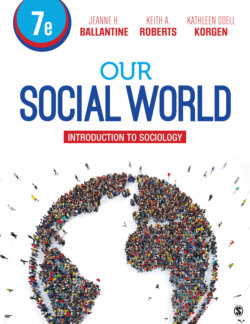Читать книгу Our Social World - Kathleen Odell Korgen - Страница 101
На сайте Литреса книга снята с продажи.
Key Points
ОглавлениеAttempts to understand society have existed for at least two and a half millennia, but gathering of scientific evidence to test hypotheses and validate claims is a modern idea.
Theories are especially important to science because they raise questions for research, and they explain the relationships among facts. Sociology has four primary, overriding theoretical perspectives or paradigms: symbolic interaction theory, rational choice theory, structural-functional theory, and conflict theory. Other perspectives, such as feminist theory, serve as correctives to the main paradigms. Most of these theories are more applicable at either the micro to meso level or at the meso to macro level.
Sociology is a science used to study society, and therefore it is essential to understand what is—and what is not—considered data or evidence. For a scientist, this means that ideas must be tested empirically, that is, scientifically.
As social scientists, sociologists use eight systematic steps to gather data and test theories about the social world.
The independent variable is the variable in a cause-and-effect relationship that comes first in a time sequence and causes a change in another variable—the dependent variable.
Major methods for gathering data in sociology include questionnaires, interviews, observational studies, secondary data analysis, content analysis, and experiments.
Quantitative data come in the form of numbers (e.g., derived from questionnaires or some secondary sources such as the census), and qualitative data come in nonnumerical forms (e.g., derived from semistructured and unstructured interviews or observational studies).
Use of multiple methods—triangulation—increases confidence in the findings.
Scientific confidence in results requires representative samples, usually drawn randomly.
Responsible research requires sensitivity to the ethics of research—ensuring that gathering scientific data does no one harm.
Public sociologists use sociological tools to understand and inform citizens about how society operates and to improve society.
